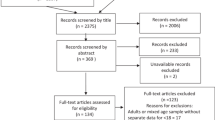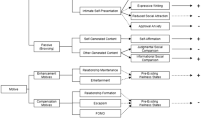Abstract
We examined associations between children’s health status and the quality of their peer relationships, as well as factors that may account for individual variation in the quality of chronically ill and healthy children’s peer relationships. Our sample included 268 children (138 boys; 130 girls) with 149 European-Americans and 119 African-Americans. There were 91 children with a chronic illness; 35 with asthma, 26 with diabetes, and 30 with obesity. Chronically ill children were characterized by teachers as displaying less prosocial behavior, less overt aggression, and less relational aggression with peers than healthy children. Chronically ill children reported lower levels of peer contact and higher levels of social anxiety than healthy children. Among chronically ill children those with high self-esteem were more prosocial and less aggressive than those with low self-esteem. Our findings suggest that chronically ill children are at risk for peer relationship difficulties, but that self-esteem may serve as a protective factor against poor peer relationships for some chronically ill children.




Similar content being viewed by others
References
Achenbach, T. M. (1991). Manual for the child behavior checklist/4–18 and 1991 profile. Burlington, VT: University of Vermont, Department of Psychiatry.
Achenbach, T., & Edelbrock, C. (1983). Manual for the Child Behavioral Checklist and Revised Child Behavior Profile. Burlington, VT: Queen City Printers.
Aiken, L. S., & West, S. G. (1991). Multiple regression: Testing and interpreting interactions. Newbury Park, CA: Sage.
Anderman, E. M. (2002). School effects on psychological outcomes during adolescence. Journal of Educational Psychology, 94, 795–809. doi:10.1037/0022-0663.94.4.795.
Bloom, B., Dey, A. N., & Freeman, G. (2006). Summary health statistics for US children: National Health Interview Survey, 2005. Series 10, Data from the National Health Survey. Vital and Health Statistics, 10(231),1–84.
Brown, B. B., & Klute, C. (2003). Friendships, cliques, and crowds. In G. R. Adams & M. D. Berzonsky (Eds.), Blackwell handbook of adolescence (pp. 330–348). Maiden, MA: Blackwell.
Buhs, E. S., & Ladd, G. W. (2001). Peer rejection in kindergarten as an antecedent of young children’s school adjustment: An examination of mediating processes. Developmental Psychology, 37, 550–560. doi:10.1037/0012-1649.37.4.550.
Cadman, D., Boyle, M., Szatmari, P., & Offord, D. R. (1987). Chronic illness, disability, and mental and social well-being: Findings of the Ontario child health study. Pediatrics, 79, 805–813.
Crick, N. (1996). The role of overt aggression, relational aggression, and prosocial behavior in the prediction of children’s future social adjustment. Child Development, 67, 2317–2327. doi:10.2307/1131625.
Crick, N., & Grotpeter, J. K. (1995). Relational aggression, gender, and social-psychological adjustment. Child Development, 66, 710–722.
de Bruyn, E. H., & van den Boom, D. C. (2005). Interpersonal behavior, peer popularity and self-esteem in early adolescence. Social Development, 14, 555–573. doi:10.1111/j.1467-9507.2005.00317.x.
Drotar, D. (1981). Psychological perspectives in chronic childhood illness. Journal of Pediatric Psychology, 6, 211–228. doi:10.1093/jpepsy/6.3.211.
Eccles, J. S., Wigfield, A., Flanagan, C. A., Miller, C., Reuman, D. A., & Yee, D. (1989). Self-concepts, domain values, and self-esteem: Relations and changes at early adolescence. Journal of Personality, 57, 283–309. doi:10.1111/j.1467-6494.1989.tb00484.x.
Eccles, J., Wigfield, A., Harold, R. D., & Blumenfeld, P. (1993). Age and gender differences in children’s self- and task perceptions during elementary school. Child Development, 64, 830–847.
Fuligni, A. J., Eccles, J. S., Barber, B. L., & Clements, P. (2001). Early adolescent peer orientation and adjustment during high school. Developmental Psychology, 37, 28–36. doi:10.1037/0012-1649.37.1.28.
Gartstein, M. A., Noll, R. B., & Vannatta, K. (2000). Childhood aggression and chronic illness: Possible protective mechanisms. Journal of Applied Developmental Psychology, 21, 315–333. doi:10.1016/S0193-3973(00)00043-5.
Hirsch, B. J., & Rapkin, B. D. (1987). The transition to junior high school: A longitudinal study of self-esteem, psychological symptomatology, school life, and social support. Child Development, 58, 1235–1243. doi:10.2307/1130617.
Hymel, S., Rubin, K. H., Rowden, L., & Lemare, L. (1990). Children’s peer relationships: Longitudinal prediction of internalizing and externalizing problems from middle childhood. Child Development, 61, 2004–2021.
Ladd, G. W. (2006). Children’s peer relations and social competence: A century of progress. Current Perspectives in Psychology. New Haven, CT: Yale University Press.
Ladd, G. W., & Troop-Gordon, W. (2003). The role of chronic peer difficulties in the development of children’s psychological adjustment problems. Child Development, 74, 1344–1367. doi:10.1111/1467-8624.00611.
La Greca, A. M. (1990). Social consequences of pediatric conditions: Fertile area for future investigation and intervention. Journal of Pediatric Psychology, 15, 285–307. doi:10.1093/jpepsy/15.3.285.
La Greca, M. (1992). Peer influences in pediatric chronic illness: An update. Journal of Pediatric Psychology, 17, 775–784. doi:10.1093/jpepsy/17.6.775.
La Greca, A. M., & Stone, W. L. (1993). Social anxiety scale for children—revised: Factor structure and concurrent validity. Journal of Clinical Child Psychology, 22, 17–27. doi:10.1207/s15374424jccp2201_2.
MacKinnon-Lewis, C., Lamb, M. E., Arbuckle, B., Baradaran, L. P., & Volling, B. L. (1992). The relationship of biased maternal and filial attributions and the aggressiveness of their interactions. Development and Psychopathology, 4, 403–415. doi:10.1017/S0954579400000869.
Meece, D. W., & Laird, R. D. (2006). The importance of peers. In F. A. Villarruel & T. Luster (Eds.), The crisis in youth mental health: Critical issues and effective programs, Vol 2: Disorders in Adolescence child psychology and mental health (pp. 283–311). Westport, CT: Praeger Publishers.
Meijer, S. A., Sinnema, G., Bijstra, J. O., Melienbergh, G. J., & Wolters, W. (2000a). Peer interaction in adolescents with a chronic illness. Personality and Individual Differences, 29, 799–810. doi:10.1016/S0191-8869(99)00233-0.
Meijer, S. A., Sinnema, G., Bijstra, J. O., Mellenbergh, G. J., & Wolters, W. H. G. (2000b). Social functioning in children with a chronic illness. Journal of Child Psychology and Psychiatry and Allied Disciplines, 41, 309–317. doi:10.1111/1469-7610.00615.
Nassau, J. H., & Drotar, D. (1995). Social competence in children with IDDM and asthma: Child, teacher, and parent reports of children’s social adjustment, social performance, and social skills. Journal of Pediatric Psychology, 20, 187–204. doi:10.1093/jpepsy/20.2.187.
Noll, R. B., Vannatta, K., Koontz, K., Kalinyak, K., Bukowski, W. M., & Davies, W. H. (1996). Peer relationships and emotional well-being of youngsters with Sickle Cell Disease. Child Development, 67, 423–436.
Perrin, J. M., Bloom, S. R., & Gortmaker, S. L. (2007). The increase of childhood chronic conditions in the United States. Journal of the American Medical Association, 297, 2755–2759. doi:10.1001/jama.297.24.2755.
Reiter-Purtill, J., Gerhardt, C. A., Vannatta, K., Passo, M. H., & Noll, R. B. (2003). A controlled longitudinal study of the social functioning of children with juvenile rheumatoid arthritis. Journal of Pediatric Psychology, 28, 17–28. doi:10.1093/jpepsy/28.1.17.
Reiter-Purtill, J., & Noll, R. B. (2003). Peer relationships of children with chronic illness. In M. C. Roberts (Ed.), Handbook of pediatric psychology (3rd ed., pp. 176–197). New York, NY, USA: Guilford Press.
Schuman, W. B., & La Greca, A. M. (1999). Social correlates of chronic illness. In R. T. Brown (Ed.), Cognitive aspects of chronic illness in children (pp. 289–311). New York: Guilford Press.
Simmons, R. G., Black, A., and Zhou, Y. (1991). African-American versus white children and the transition into junior high school. American Journal of Education 481–520. doi:10.1086/443995.
Skinner, T. C., John, M., & Hampson, S. E. (2000). Social support and personal models of diabetes as predictors of self-care and well-being: A longitudinal study of adolescents with diabetes. Journal of Pediatric Psychology, 25, 257–267.
Spirito, A., De Lawyer, D., & Stark, L. (1991). Peer relations and social adjustment of chronically ill children and adolescents. Clinical Psychology Review, 11, 539–564. doi:10.1016/0272-7358(91)90003-D.
Tomada, G., & Schneider, B. H. (1997). Relational aggression, gender, and peer acceptance: Invariance across culture, stability over time, and concordance among informants. Developmental Psychology, 33, 601–609.
Wallander, J. L., & Varni, J. W. (1989). Social support and adjustment in chronically ill and handicapped children. American Journal of Community Psychology, 17, 185–201.
Wallander, J. L., Varni, J. W., Babani, L., Banis, H. T., & Wilcox, K. (1988). Children with chronic physical disorders: Maternal reports of their psychological adjustment. Journal of Pediatric Psychology, 13, 197–212. doi:10.1093/jpepsy/13.2.197.
Wentzel, K. R. (2003). Sociometric status and adjustment in middle school: A longitudinal study. The Journal of Early Adolescence, 23, 5–28. doi:10.1177/0272431602239128.
Wigfield, A., Eccles, J. S., MacIver, D., & Rueman, D. A. (1991). Transitions during early adolescence: Changes in childrens domain-specific self-perceptions and general self-esteem across the transition to junior high school. Developmental Psychology, 27, 552–565. doi:10.1037/0012-1649.27.4.552.
Acknowledgments
This investigation was part of a larger longitudinal research project, supported by a grant to Carol MacKinnon-Lewis from the William T. Grant Foundation, examining family and school factors that influence early adolescents’ adjustment during the transition to middle school. The present study is based on a thesis submitted by Elizabeth McCarroll to the faculty of Texas Tech University in partial fulfillment of the requirements for the MS degree. The authors would like to thank Allison Allmon, Kelly Barrow, Angela Walker, and all of the graduate and undergraduate research assistants who worked on this study. We are also grateful to the parents and children who participated in the research.
Author information
Authors and Affiliations
Corresponding author
Rights and permissions
About this article
Cite this article
McCarroll, E.M., Lindsey, E.W., MacKinnon-Lewis, C. et al. Health Status and Peer Relationships in Early Adolescence: The Role of Peer Contact, Self-esteem, and Social Anxiety. J Child Fam Stud 18, 473–485 (2009). https://doi.org/10.1007/s10826-008-9251-9
Received:
Accepted:
Published:
Issue Date:
DOI: https://doi.org/10.1007/s10826-008-9251-9




